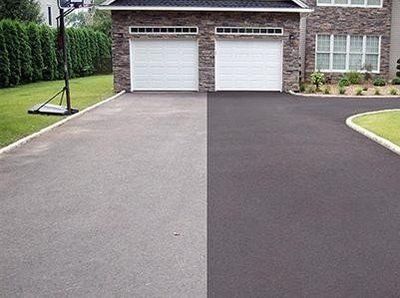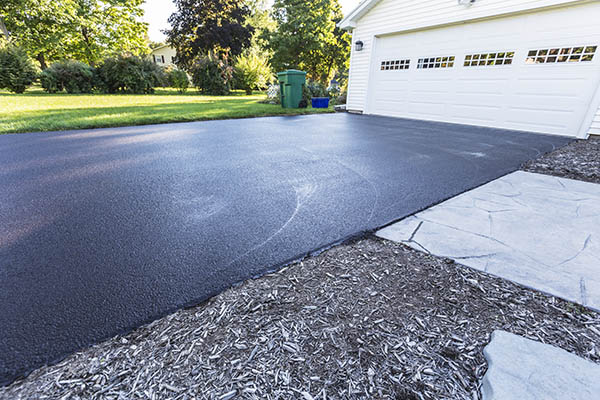Discover the Power of Industrial Parking Lot Paving and Asphalt Sealing
Discover the Power of Industrial Parking Lot Paving and Asphalt Sealing
Blog Article
Hot Mix Asphalt: A Sustainable Option for Sidewalk
Warm Mix Asphalt (HMA) has become a leading lasting option for sidewalk solutions, providing a myriad of environmental advantages and cutting-edge technologies. Its ability to lower and recycle products energy consumption presents an engaging instance for its fostering in roadway building jobs. Furthermore, the long-term performance and resilience of HMA make it a preferred option for framework development. As the demand for environment-friendly building practices expands, checking out the nuances of HMA's sustainability can give useful insights into the future of pavement services.
Environmental Benefits of Warm Mix Asphalt

Additionally, Warm Mix Asphalt assists to alleviate metropolitan warm island effects. Its dark shade absorbs sunlight, reducing the quantity of heat mirrored back into the environment contrasted to lighter-colored sidewalks. This can reduce ambient temperature levels in urban locations, decreasing the demand for air conditioning and eventually reducing power intake.
Additionally, Hot Mix Asphalt adds to improved stormwater administration. Its permeable nature allows water to recharge and infiltrate the pavement groundwater products, minimizing overflow and the risk of flooding. These environmental benefits make Warm Mix Asphalt a sustainable choice for leading freeways and roadways.
Energy Effectiveness in HMA Production
Is power performance a crucial element in the production of Hot Mix Asphalt (HMA)? Absolutely. Power plays a significant role in the production of HMA, impacting both expense and ecological sustainability. One essential element of power performance in HMA manufacturing is using warm mix asphalt (WMA) innovations (angled parking). WMA permits the mixing and positioning of asphalt at reduced temperature levels compared to standard hot mix asphalt, causing reduced power usage during manufacturing. This process not only decreases fuel use however additionally lowers greenhouse gas emissions, making it an extra eco-friendly alternative.
Moreover, innovations in plant innovations have actually led to more energy-efficient HMA production processes. By maximizing energy use in HMA manufacturing, the industry can minimize its carbon footprint while preserving high-quality pavement products.
Recyclability of Warm Mix Asphalt
The recyclability of Warm Mix Asphalt (HMA) is a critical facet of its sustainability and lasting environmental effect. HMA is just one of the most recycled materials in the United States, with over 100 million bunches of reclaimed asphalt pavement (RAP) being reused yearly in brand-new sidewalk construction. Recycling HMA provides a number of environmental benefits, such as minimizing the demand for virgin products, decreasing power consumption during production, and reducing the quantity of waste sent out to garbage dumps.
The procedure of reusing HMA involves milling the existing pavement, crushing my explanation it into smaller sized items, and mixing it with new aggregate and asphalt binder to the original source create a recycled mix. This recycled mix can often carry out as well as or even much better than traditional HMA, while needing less raw products and creating lower greenhouse gas discharges. By integrating RAP right into brand-new sidewalk tasks, roadway companies can save all-natural sources, minimize expenses, and reduce the environmental footprint of roadway building and construction and upkeep tasks. Generally, the recyclability of HMA plays a considerable function in promoting lasting techniques within the sidewalk market.

Long-Term Performance of HMA
Asphalt pavements show resilience and durability over an extended period, reflecting the long-term performance of Warm Mix Asphalt (HMA) In addition, innovations in HMA technology, such as the usage of polymer-modified binders like it and warm mix asphalt, have actually further improved the longevity and durability of HMA sidewalks. By prioritizing high quality building and construction and upkeep practices, HMA proceeds to confirm itself as a cost-effective and sustainable service for lasting pavement framework.

HMA: Longevity and Sustainability
Showing both sturdiness and sustainability, Warm Mix Asphalt (HMA) has come to be a foundation in the construction of resilient pavement facilities - regrading. HMA's resilience comes from its capacity to endure hefty loads, rough climate condition, and high website traffic quantities, making it a reputable selection for streets, highways, and flight terminal paths. The structure of HMA, which typically includes accumulations, binder, and filler, plays an important duty in improving its long life and resistance to deterioration
Additionally, HMA's sustainability lies in its recyclability and energy-efficient production procedure. The ability to recycle redeemed asphalt pavement (RAP) in new HMA blends reduces the need for virgin materials and lessens the ecological impact of pavement building and upkeep. Additionally, the energy performance of generating HMA hinges on its lower mixing temperature levels contrasted to other pavement materials, causing lowered power intake and greenhouse gas discharges.
Final Thought
Finally, hot mix asphalt (HMA) provides a sustainable option for sidewalk with its eco pleasant characteristics. HMA's recyclability, energy efficiency in manufacturing, and long-term resilience make it an environment-friendly option for roadway building. By saving natural deposits, minimizing waste, and reducing greenhouse gas discharges, HMA plays a vital function in promoting sustainability in facilities growth. Its capability to reduce urban heat island results better emphasizes its relevance in developing environmentally aware and resistant sidewalk systems.
HMA is one of the most recycled materials in the United States, with over 100 million loads of redeemed asphalt sidewalk (RAP) being reused each year in brand-new pavement building and construction.The process of reusing HMA includes crushing the existing pavement, crushing it right into smaller items, and mixing it with brand-new aggregate and asphalt binder to create a recycled mix.Asphalt sidewalks demonstrate resilience and strength over a prolonged duration, showing the long-lasting efficiency of Hot Mix Asphalt (HMA) In addition, improvements in HMA technology, such as the use of polymer-modified binders and cozy mix asphalt, have actually additionally enhanced the sturdiness and long life of HMA sidewalks. The capacity to recycle reclaimed asphalt sidewalk (RAP) in brand-new HMA mixes lowers the need for virgin products and decreases the ecological effect of sidewalk building and construction and maintenance.
Report this page